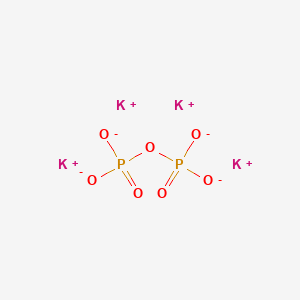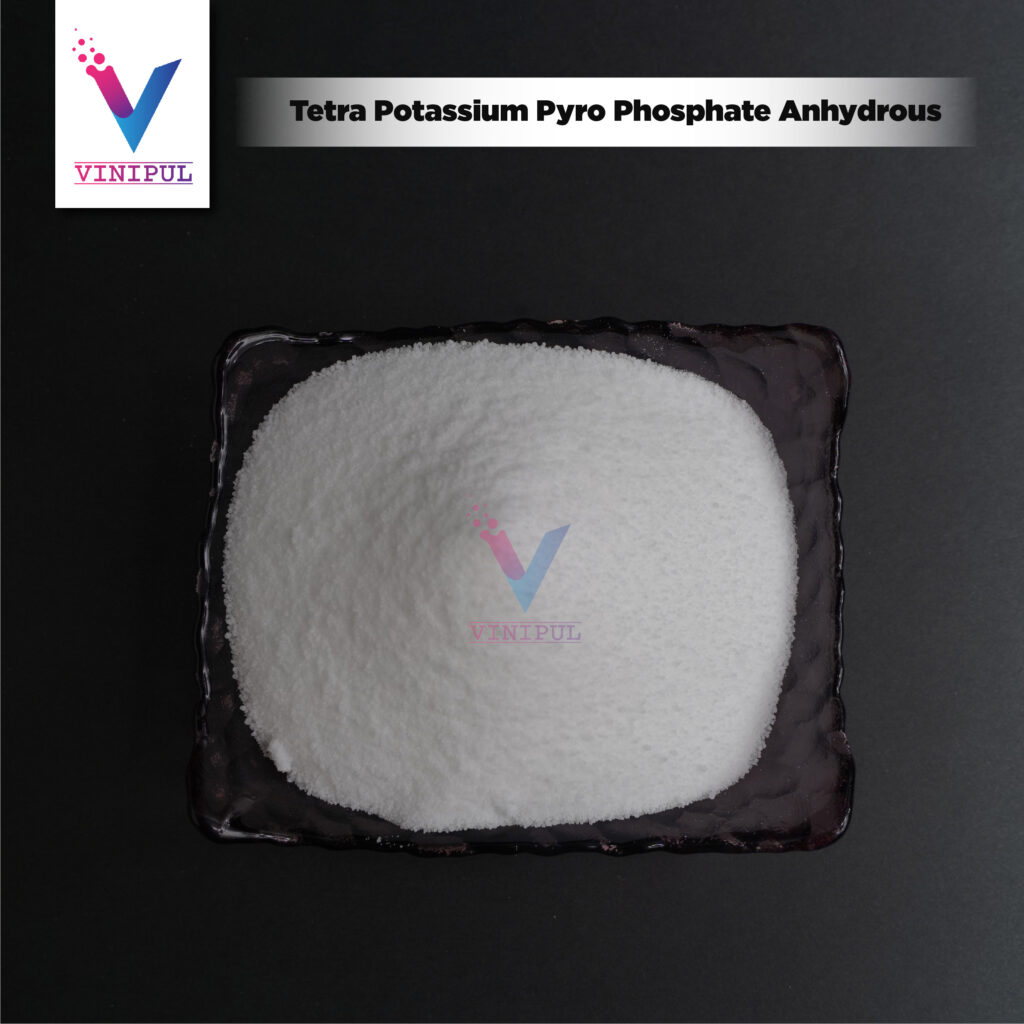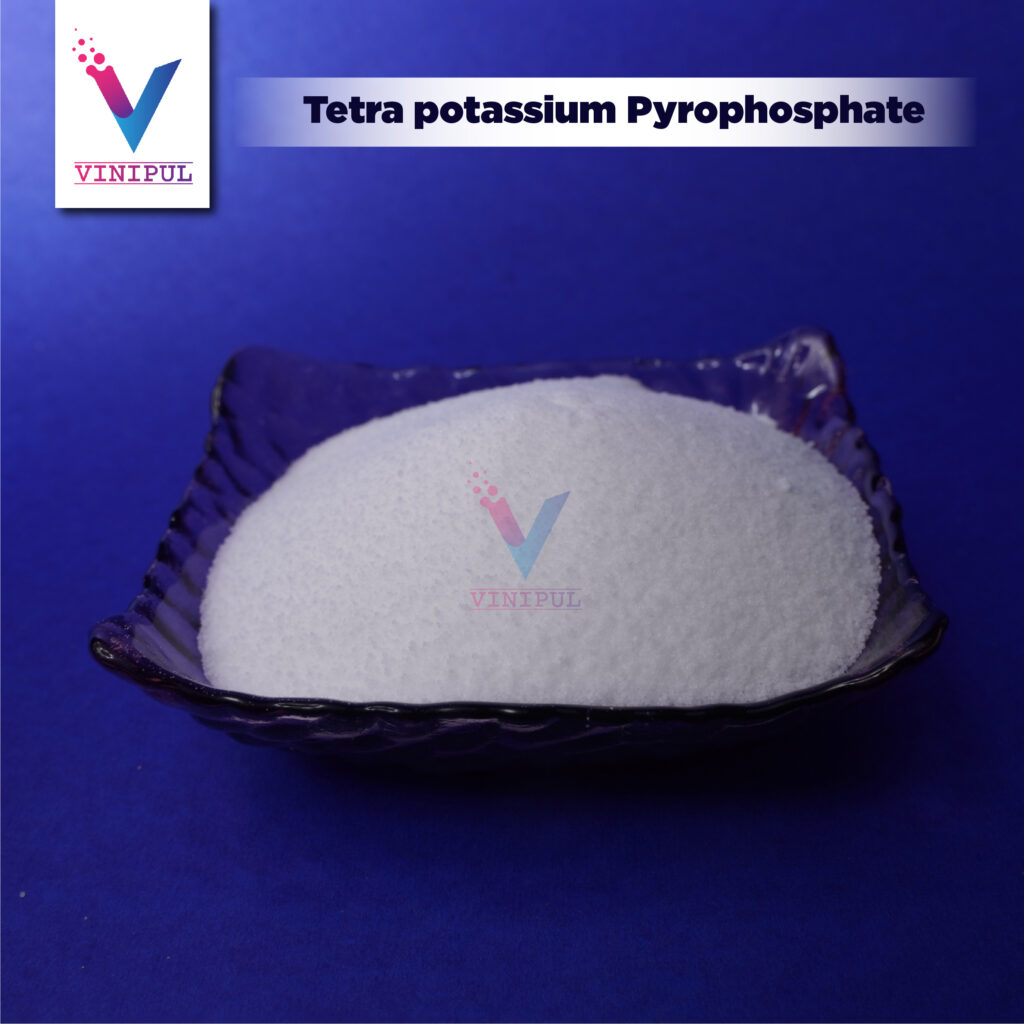Tetrapotassium Pyrophosphate Manufacturer and Supplier
CAS No.: 7320-34-5 | EC Number.: 230-785-7 | Molecular formula.: K4P2O7, K4O7P2
Tetrapotassium Pyrophosphate
Tetrapotassium Pyrophosphate Manufacturers, Tetrapotassium Pyrophosphate Suppliers, Tetrapotassium Pyrophosphate Formula, Tetrapotassium Pyrophosphate MSDS, Tetrapotassium Pyrophosphate SDS, Tetrapotassium Pyrophosphate Exporter in Mumbai, India.
Vinipul Chemicals Pvt. Ltd is a renowned manufacturer, supplier, and exporter based in India, specializing in the production of high-purity Tetrapotassium Pyrophosphate CAS No. 7320-34-5, our company is recognized for delivering Tetrapotassium Pyrophosphate that exhibits an accurate composition and is free from impurities. Our commitment to quality is upheld by utilizing superior purity chemicals and employing the latest manufacturing equipment, ensuring that our product meets the stringent standards set by the international industry.
As a leading Tetrapotassium Pyrophosphate supplier, we take pride in offering K4P2O7 of exceptional quality. Our product is meticulously formulated to possess the precise composition required for optimal performance in various applications. We understand the importance of reliability and longevity, which is why our Tetrapotassium Pyrophosphate is designed to have a long shelf life, providing consistent results over an extended period.
As a leading speciality chemicals & tetrapotassium pyrophosphate suppliers, we prioritize customer satisfaction by delivering high-quality Tetra Potassium Pyrophosphate that meets the demands of diverse industries. With our focus on accurate composition, impurity-free formulation, and extended shelf life, Vinipul Chemicals Pvt. Ltd is the trusted choice for obtaining Tetrapotassium Pyrophosphate of fine quality and consistent performance.
What is Tetrapotassium Pyrophosphate?
Tetrapotassium pyrophosphate, which is also known as potassium pyrophosphate, tetrapotassium phosphate, or TSPP, is an inorganic compound represented by the chemical formula K4P2O7. Tetrapotassium pyrophosphate exists as a white, water-soluble solid due to its salt-like nature. The compound consists of pyrophosphate anions and potassium ions. It is important to note that the toxicity of tetrapotassium pyrophosphate is approximately twice that of table salt when consumed orally. It serves as an efficient buffering and dispersing agent, offering a wide range of applications in the food and industrial sectors. Notably, TKPP exhibits higher solubility in water and possesses chelating capabilities, making it a versatile ingredient in various formulations.
Overall, Tetrapotassium Pyrophosphate (TKPP) offers distinct properties and applications, including its water solubility, chelating capabilities, and use as a buffering and dispersing agent. The manufacturing process described involves the conversion of potassium tripolyphosphate to tetra potassium pyrophosphate through appropriate adjustments and thermal treatment.
Tetrapotassium Pyrophosphate Details
This table provides information about Tetrapotassium Pyrophosphate, a chemical compound with the CAS No. 7320-34-5 and EC Number. 230-785-7. The table also lists various Tetrapotassium Pyrophosphate common name and synonyms. The table contains Tetrapotassium Pyrophosphate structure, Tetrapotassium Pyrophosphate solubility and molecular formula. It is a white granular powder of monoclinic crystals. Tetrapotassium Pyrophosphate pH. value is also mentioned in the table. Tetrapotassium Pyrophosphate is commonly used in various industries in different applications. It is also used in the pharmaceutical industry for various purposes.
Specifications
| Chemical name | Tetrapotassium Pyrophosphate |
| CAS No | 7320-34-5 |
| EC Number | 230-785-7 |
| Commercial name / Synonyms | Potassium pyrophosphate, 7320-34-5,Diphosphoric acid, tetrapotassium salt, Potassium diphosphate, TKPP, Tetrapotassium diphosphate, TETRAPOTASSIUM PYROPHOSPHATE, Potassium pyrophosphate, Diphosphoric acid, potassium salt |
| Molecular formula | K4P2O7 K4O7P2 |
| Chemical Structure |  |
| Melting Point | 1090 °C |
| IUPAC Name | tetrapotassium;phosphonato phosphate |
| Component Compounds | Potassium Pyrophosphoric acid |
| Physical Form | NA |
| Physical Appearance | Potassium tetrapyrophosphate is a whitish-colored powdered solid. |
| Solubility | insoluble in ammonia, alcohol |
| Solubility in water | 2.61 g/100 mL (0 °C) 6.7 g/100 mL (25 °C) 42.2 g/100 mL (100 °C) |
| pH | Between 10,0 and 10,8 (1 % solution) |
| Packaging Details | 25 kg / 50 kg / HDPE packaging bags / Drum/ As per Client’s requirements |
Computed Properties
| Property Name | Property Value |
| Molecular Weight | 330.34 g/mol |
| Hydrogen Bond Acceptor Count | 7 |
| Exact Mass | 329.7667523 g/mol |
| Monoisotopic Mass | 329.7667523 g/mol |
| Heavy Atom Count | 13 |
| Topological Polar Surface Area | 136Ų |
| Complexity | 124 |
| Covalently-Bonded Unit Count | 5 |
| Compound Is Canonicalized | Yes |
Related Compounds with Annotation
The table contains information on various compounds and their properties related to Tetrapotassium Pyrophosphate. It includes the compound names, Compound IDs (CIDs), neighbour types, and annotation types count. The compounds listed include potassium pyrophosphate, pentapotassium triphosphate, dipotassium pyrophosphate, potassium phosphate, dipotassium zinc diphosphate, potassium hypophosphate, and others. The CIDs serve as unique identifiers for each compound. The neighbour type is specified as 2D, indicating the type of molecular structure representation. The annotation types count refers to the number of different annotations associated with each compound. Overall, the table provides a concise overview of multiple compounds and their corresponding properties.
Tetrapotassium Pyrophosphate Price
| Product Range | Price |
| Tetrapotassium Pyrophosphate Anhydrous | Rs 110/kg |
| Tetrapotassium Phosphate | Rs 160/kg |
| TKPP / TPPP | Rs 300/kg |
| Tetra Potassium Pyro Phosphate | Rs 160/kg |
| Tetra Potassium Pyro Phosphate Pure | Rs 160/kg |
| Tetra Potassium Pyro Phosphate Technical | Rs 160/kg |
Prices shown above are provisional prices and may change due to different market conditions for latest prices
Call Us
+91-932 223 1817
Mail Us
business@vinipulchemicals.com
Types of Tetrapotassium Pyrophosphate

Tetrapotassium Pyrophosphate Anhydrous
Tetrapotassium Pyrophosphate Anhydrous refers to the anhydrous (water-free) form of the compound. It is a white, crystalline powder that is highly soluble in water. It is commonly used as a buffering and dispersing.

Tetrapotassium Phosphate
Tetrapotassium Phosphate, on the other hand, is a general term used to describe the compound in its various hydrated and anhydrous forms. It is also a white, crystalline powder that is soluble in water. Tetrapotassium Phosphate is utilized in a wide range of applications.

TKPP / TPPP
TKPP or TPPP is an abbreviation for Tetrapotassium Pyrophosphate. These terms are often used interchangeably to refer to the compound in its general form. It denotes the salt composed of four potassium ions and the pyrophosphate anion.

Tetra Potassium Pyro Phosphate
Tetra Potassium Pyro Phosphate Pure implies that the compound is of high purity, free from impurities or contaminants. It is often used in applications where stringent quality standards are required, such as in food and pharmaceutical industries.

Tetra Potassium Pyro Phosphate Pure
This indicates that the tetrapotassium pyrophosphate being referred to is of high purity, typically used in applications where strict quality standards are required.

Tetra Potassium Pyro Phosphate Technical
Tetra Potassium Pyro Phosphate Technical, on the other hand, refers to a grade or form of the compound that may have slightly lower purity levels compared to the pure form.
Overall, tetrapotassium pyrophosphate is a versatile compound with diverse applications ranging from food processing to industrial uses. Its properties make it valuable in various industries due to its ability to act as a sequestrant, buffering agent, emulsifier, and cleaning agent, among other functions.
How to Make Tetrapotassium Pyrophosphate?
The production of tetra potassium pyrophosphate involves a carefully controlled manufacturing process. Firstly, potassium tripolyphosphate, along with a potassium salt that has the ability to convert into potassium carbonate when subjected to calcination, are combined. The goal is to achieve a molar ratio of approximately 2 by adding a compound that can generate potassium carbonate.
Once the mixture is properly prepared, it undergoes a milling process to ensure homogeneity and uniform distribution of the ingredients. This step is crucial in facilitating the subsequent chemical reactions. Following milling, the mixture is subjected to controlled heating within the temperature range of 300°C to 700°C.
During the heating process, the chemical transformation takes place, converting the potassium tripolyphosphate into tetra potassium pyrophosphate. The elevated temperatures facilitate the necessary chemical reactions and molecular rearrangements, leading to the desired compound formation. The resulting tetra potassium pyrophosphate possesses distinct properties and finds applications across various industries due to its chemical composition and characteristics.
By carefully adjusting the molar ratio and subjecting the mixture to controlled heating, the manufacturing process successfully yields tetra potassium pyrophosphate, an important compound with valuable industrial applications. This compound is utilized in diverse fields such as food production, detergents, water treatment, and other industrial processes where its unique properties and functionalities are highly sought after.
What is tetrapotassium pyrophosphate used for in toothpaste?
Tetrapotassium pyrophosphate plays a crucial role in toothpaste and dental floss as a tartar control agent. Its main function is to eliminate calcium and magnesium found in saliva, effectively preventing the deposition of these minerals on teeth. By incorporating tetrapotassium pyrophosphate into oral care products, it assists in reducing plaque formation. In addition, it is commonly used in commercial dental rinses as a preliminary step before brushing to further enhance the reduction of plaque.
The inclusion of tetrapotassium pyrophosphate in toothpaste and dental floss helps maintain oral hygiene by combating tartar buildup. By targeting the minerals present in saliva, it prevents them from adhering to teeth, ultimately reducing the formation of tartar. Its beneficial properties are also harnessed in dental rinses, where it aids in the reduction of plaque. This compound serves as an effective tool in the fight against oral health issues and contributes to a healthier mouth when used in conjunction with regular brushing and flossing.
Is tetrapotassium pyrophosphate a preservative?
Tetrapotassium pyrophosphate, commonly referred to as TSP, finds various applications in the food industry. It is utilized as an emulsifier in cheese production, aiding in the smooth blending of ingredients and enhancing the texture of the final product. Additionally, TSP serves as a color preservative in soybean paste, helping to maintain its appearance and quality over time.
In processed meat products, TSP plays a significant role as well. It functions as an additive, assisting in improving the texture and consistency of the meat. By acting as a binding agent, TSP helps to bind water and fat together, resulting in a more cohesive and desirable texture in processed meats. These versatile properties make tetrapotassium pyrophosphate a valuable ingredient in various food applications, contributing to the quality and overall consumer experience.
What is the difference between phosphate and pyrophosphate?
Phosphate and pyrophosphate are both chemical compounds that contain phosphorus, but they differ in their molecular structures and properties.
Phosphate refers to a single phosphate group (PO4), which consists of one central phosphorus atom bonded to four oxygen atoms. Phosphates are commonly found in nature and play essential roles in biological processes, such as energy transfer (in the form of ATP) and DNA and RNA synthesis. They are also used as a source of phosphorus in fertilizers and as additives in food and beverage products.
On the other hand, pyrophosphate (P2O7) consists of two phosphate groups linked together. It contains two central phosphorus atoms bonded to seven oxygen atoms. Pyrophosphates are known for their ability to form stable complexes with metal ions, making them useful in various industrial applications, such as water treatment and food processing. They are often used as chelating agents, sequestering metal ions and preventing their unwanted interactions or reactions.
The main distinction between phosphate and pyrophosphate lies in their molecular structures and their specific functions in different contexts. Phosphate refers to a single phosphate group and is involved in vital biological processes, while pyrophosphate consists of two phosphate groups and is commonly utilized for its chelating properties in industrial applications.
Industrial Applications
Tetrapotassium pyrophosphate (TKPP) finds numerous industrial applications due to its unique properties and chemical composition. Some of the key tetrapotassium pyrophosphate uses are:

Detergents and Cleaning Products
TKPP is widely used as a component in detergents and cleaning products. Tetrapotassium pyrophosphate cleaner’s chelating properties help in the removal of mineral deposits and metal ions, enhancing the cleaning efficiency of these products. TKPP also acts as a buffering agent, maintaining the pH stability of detergents.

Water Treatment
TKPP is employed in water treatment processes, particularly for controlling scale and corrosion in industrial water systems. Tetrapotassium pyrophosphate in food helps prevent the formation of scale deposits caused by calcium and magnesium ions, thereby improving the efficiency and lifespan of water treatment equipment.

Food Industry
TKPP is approved as a food additive by regulatory authorities and is commonly used in the food industry. It functions as a sequestrant, stabilizer, and emulsifier in various food products. TKPP helps to improve the texture, stability, and shelf life of processed foods, such as canned meats, dairy products, and beverages.

Metal Treatment
TKPP is utilized in metal treatment processes, such as metal cleaning, surface preparation, and electroplating. It assists in the removal of rust, oil, and other contaminants from metal surfaces, preparing them for subsequent treatments like coating or plating.

Industrial Chemicals
TKPP is a valuable component in various industrial chemicals, including specialty cleaners, degreasers, and solvents. Its ability to dissolve and disperse a wide range of substances makes it suitable for formulating chemical products used in various industrial applications.
These are just a few examples of the industrial applications of Tetrapotassium Pyrophosphate. Its versatility, solubility, and chelating properties make it a valuable ingredient in numerous industries, contributing to improved performance, efficiency, and quality in various processes and products.
What is tetrapotassium pyrophosphate used for?
Tetrapotassium Pyrophosphate finds extensive applications across various industries:
- Buffering and Dispersing Agent: Tetrapotassium Pyrophosphate is widely employed as a buffering and dispersing agent. It helps in maintaining the stability and uniformity of various formulations, ensuring optimal performance.
- Oil Drying and Synthetic Rubber Production: This compound is utilized in the oil industry for oil drying processes. It aids in the removal of moisture, improving the quality of oils. Additionally, Tetrapotassium Pyrophosphate is a key component in the production of synthetic rubber, contributing to its formation and performance.
- Protein Modifier, Coagulant, and Mineral Supplement: Tetrapotassium Pyrophosphate serves as a protein modifier and coagulant in various applications. It helps modify and enhance the properties of proteins, ensuring desired functionalities. Moreover, it can act as a mineral supplement, providing essential minerals in certain formulations.
- Industrial Use in Paints, Coatings, Surface Treatment, and Detergent Manufacturing: Tetrapotassium Pyrophosphate has significant industrial applications in the production of paints, coatings, and surface treatment products. It helps improve the performance and durability of these formulations. Additionally, it is employed in detergent manufacturing, where it contributes to the cleaning and foaming properties of the products.
About Company
Vinipul Chemicals Pvt. Ltd is a highly reputed company known for its exceptional expertise in the manufacturing, supplying, and exporting of Tetrapotassium Pyrophosphate and a wide range of other chemicals. With a strong presence in the industry, Vinipul Chemicals has established itself as a trusted tetrapotassium pyrophosphate manufacturer India, offering top-quality products and unmatched customer service. As a leading manufacturer, Vinipul Chemicals excels in producing Tetrapotassium Pyrophosphate and ensures its superior quality through stringent quality control measures. The company utilizes advanced manufacturing techniques and state-of-the-art equipment to maintain the highest standards of purity, accuracy, and consistency in its products.
With a dedicated team of professionals and a customer-centric approach, Vinipul Chemicals strives to exceed industry standards and fulfil the diverse requirements of its customers. The company’s unwavering focus on product excellence, combined with a strong ethical framework, has earned it a reputation for being a reliable partner in the chemical industry. In addition to Tetrapotassium Pyrophosphate, Vinipul Chemicals offers a comprehensive range of chemicals, catering to various industries such as pharmaceuticals, food processing, agriculture, and more. With their extensive product portfolio and unwavering commitment to quality, Vinipul Chemicals Pvt. Ltd has become a preferred choice for customers seeking reliable chemical solutions.
FAQ's
Yes, TKPP is generally recognized as safe for consumption by regulatory authorities when used in accordance with the specified limits. However, it is essential to follow recommended usage levels and adhere to regulatory guidelines.
No, TKPP is not typically permitted for use in organic food products, as it is considered a synthetic additive. Organic food regulations generally prohibit the use of synthetic substances.
TKPP should be stored in a cool, dry place, away from direct sunlight and sources of heat. It is advisable to follow the manufacturer’s guidelines regarding storage conditions to maintain its quality and stability.
Vinipul Chemicals offers various packaging options, including 25 kg / 50 kg / HDPE packaging bags / Drum or packaging as per Client’s requirements
Yes, TKPP can be used in cosmetics and personal care products as a buffering agent, emulsifier, or pH adjuster. It is important to comply with regulatory guidelines and restrictions for cosmetic ingredient usage.
TKPP is generally compatible with a wide range of chemicals and ingredients. However, it is recommended to conduct compatibility tests and consult with technical experts or suppliers to ensure compatibility in specific applications.
TKPP is considered to have low acute toxicity and low environmental persistence. However, it is crucial to handle and dispose of TKPP responsibly, following local regulations and best practices to minimize any potential environmental impact.
Yes, TKPP is commonly employed in water treatment applications as a sequestrant and scale inhibitor. It helps to prevent the formation of scale and control water hardness.
When handling TKPP, it is advisable to wear appropriate protective equipment, such as gloves and goggles, to minimize direct contact with the skin, eyes, and inhalation of dust. It is also important to follow safety guidelines provided by the supplier or regulatory agencies.
Yes, TKPP can be used in combination with other food additives to achieve desired functional or sensory properties. However, it is important to consider regulatory restrictions and compatibility with other additives.
TKPP may be subject to quality standards set by different regulatory bodies or industry organizations. Examples include the specifications provided by the Food Chemicals Codex (FCC) or the Joint FAO/WHO Expert Committee on Food Additives (JECFA).
Market Area
We supply and exports Tetrapotassium Pyrophosphate in all parts of the world such as
Tetrapotassium Pyrophosphate in Africa Countries
South Africa , Nigeria, Kenya, Ghana, Ethiopia, Tanzania, Algeria, Angola, Benin, Botswana, Burkina Faso, Burundi, Cabo Verde, Cameroon, Central African Republic (CAR), Chad, Comoros, Democratic Republic of the Congo, Côte d’Ivoire, Djibouti, Egypt, Equatorial Guinea, Eritrea, Gabon, Gambia, Guinea, Guinea-Bissau, Lesotho, Liberia, Libya, Madagascar, Malawi, Mali, Mauritania, Mauritius, Morocco, Mozambique, Namibia, Nigeria, Rwanda, Sao Tome and Principe, Senegal, Seychelles, Sierra Leone, Somalia, South Sudan, Sudan, Swaziland, Togo, Tunisia, Uganda, Zambia, Zimbabwe.
Tetrapotassium Pyrophosphate in Gulf Countries
Oman, Qatar, Kuwait, Saudi Arabia, Dubai, Bahrain, Iran, United Arab Emirates
Tetrapotassium Pyrophosphate in Asia Countries
Afghanistan, Armenia, Azerbaijan, Bahrain, Bangladesh, Bhutan, Brunei, Cambodia, China, Cyprus, Georgia, India, Indonesia, Iran, Iraq, Israel, Japan, Jordan, Kazakhstan, Kuwait, Kyrgyzstan, Laos, Lebanon, Malaysia, Maldives, Mongolia, Myanmar (Burma), Nepal, North Korea, Oman, Pakistan, Palestine, Philippines, Qatar, Russia, Saudi Arabia, Singapore, South Korea, Sri Lanka, Syria, Taiwan, Tajikistan, Thailand, Timor-Leste, Turkey, Turkmenistan, United Arab Emirates (UAE), Uzbekistan, Vietnam, Yemen
We supply Tetrapotassium Pyrophosphate in all parts of India.
Andhra Pradesh, Arunachal Pradesh, Assam, Bihar, Chhattisgarh, Goa, Gujarat, Haryana, Himachal Pradesh, Jammu & Kashmir, Jharkhand, Karnataka, Kerala, Madhya Pradesh, Maharashtra, Manipur, Meghalaya, Mizoram, Nagaland, Odisha, Punjab, Rajasthan, Sikkim, Tamil Nadu, Telangana, Tripura, Uttarakhand, Uttar Pradesh and West Bengal.
Note: – Please be advised that the information contained in this document is intended for illustrative purposes only. Due to variations in product grade, applications, industries, or uses, the accuracy of the information provided cannot be guaranteed. © Copyright 2023 © Vinipul Chemicals All Rights Reserved (Terms of Use). Reproduction of any material from this site is strictly prohibited without permission. Vinipul Chemicals products are exclusively sold through the company’s website. For precise product specifications and requirements, as well as advice on which products are best suited for your specific application needs, please contact us at business@vinipulchemicals.com Use Terms | Privacy.

